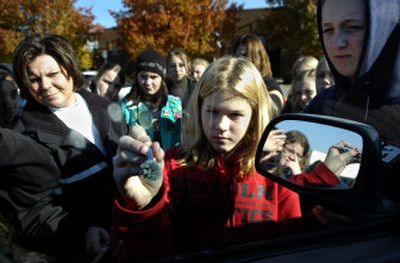Girls investigate career options

On TV, women who play crime scene investigators dress like they’re on a date.
But when four from the Washington State Patrol discussed their jobs Saturday to a group of mostly middle school girls, some wore jeans and sneakers.
“We’re not wearing camisoles or stiletto heels. On CSI, they’re always so clean and tidy, like they’re ready to put pearls on,” said WSP Detective Tracy Hansen. “Our jobs aren’t even remotely like that TV show.”
The message of Saturday’s event: Women can compete for any job, even careers that can get nasty or in fields dominated by men.
About 250 girls from the Inland Northwest learned about building roller coasters, investigating murders and remodeling homes in a day-long workshop aimed at encouraging them to consider jobs involving math and science. The event, organized by the Girl Scouts and held at Spokane Falls Community College, is in its ninth year and growing. Last year, 140 participated.
All the teachers were women, except for a male cop, who gave a police dog demonstration. For $15, the girls received lunch and three classes. They didn’t have to be Girl Scouts to participate.
“It’s important for girls to be mentored by women in math, science and technology careers,” said Stacie Davis, program director of the Girls Scouts Inland Empire Council. At least one of the three classes each participant attended was one they didn’t choose.
“We try to expose them to options that they may not have thought out as well,” Davis said.
Larkin Henkel, a Lakes Middle School student from Coeur d’Alene, said her goal of becoming an architect could be harder to achieve because some people perceive men as more suited to the job. Learning from women already in the profession helped emphasize that girls “can be anything they want to be,” Henkel said.
She said she liked being in a class without boys for a change.
“It’s kind of embarrassing to ask questions in front of guys,” Henkel said.
Indeed, a course on investigating crime scenes ran long from all the questions.
Although some girls said they would have learned just as much with boys in the classroom, others said an all-female class made it easier to concentrate.
“Boys are immature,” explained 12-year-old Rian McGowen.
The four WSP investigators showed the girls a mock crime scene in the parking lot: an empty SUV that had struck a pedestrian. Participants dusted for fingerprints, swabbed fake blood and watched as molds were taken of footprints. Later, the girls conducted tests on stains to see if they contained blood, examined bullets and got a lesson on drugs.
A lot of progress has been made by women in the field, said WSP forensic scientist Sheri Jenkins. While men still hold the vast majority of commissioned officer jobs, women are starting to dominate crime labs, Jenkins said.
The work is tough, but often rewarding, she told the girls.
“We’ll work in the heat of a Yakima day and the cold of an Okanogan night,” Jenkins said.
“A girl can do anything that she wants to even if it involves running around with a gun chasing people,” said McGowen, a seventh-grader from Clarkston.